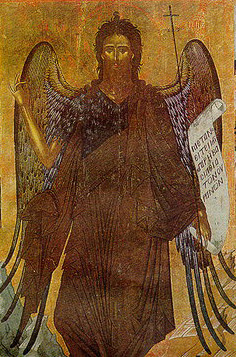On the sayings of Jesus (al-Masih)
Abu 'Uthman al-Jahiz (d.255/868) reports in his al-Bayan (3:157) that Jesus said:
"Wo unto you, slaves of this world! How your practices contradict your principles, and your whims your reason! Your words are a remedy which cures disease, but your actions are a disease which defies cure. You are not like the vine, which has fine leaves, tasty fruit, and is easy to reach, but are in truth like the acacia tree, which has few leaves, many thorns, and is difficult to reach! Woe unto you, slaves of this world! You have placed good works beneath your feet, [thinking] that they can be attained by whoever so wishes, and have placed this world far above your heads [thinking] that it cannot be reached. You are neither pious slaves nor worthy freemen. Woe unto you, wage-earners of sin! You take your wages and spoil the work. You shall meet with what you most fear, for the Taskmaster will soon see the work you have spoilt and the wages you have taken. Woe to you, debtors of evil! You begin with gifts before discharging your debt, you volunteer to perform what is superfluous but do not perform what you have been commanded to do. The owner of the debt will not accept gifts until his debt has been discharged."
al-Jahiz reports in the al-Mahasin wa-l-Addad that Jesus said to his disciples:
"Man is created into this world in four stages, in three of whihch he feels secure and in the fourth of which he is ill-disposed and fears that God will forsake him. In the first stage, he is born in three darknesses: the darkness of the belly, the darkness of the womb, and the darkness of the placenta. GOd provides for him in the darkness of the cavity of the belly. WHen he is brought out from the darkness of the belly, he falls upon milk which he does not advance toward on foot or leg, or obtain with his hand or move stronly towrd, but he is forced to it and rewarded with it until flesh and blood grow upon him. Weaned from milk, he falls upon the third stage: food provided by his parents, who earn it either lawfully or unlawfully. When his parents die, people take pity on him, one person feeding him, another giving him drink, another sheltering him, and another clothing him. When he fals upon the fourth stage and has grown strong and erect and has become a man, he fears that he will not be provided for, so he attacks people, betrays their trust, robs their belongings, and carries away their wealth, fearing that God Almighty might forsake him."
(excerpts taken from the collection of translations by Tarif Khalidi, The Muslim Jesus: Sayings and Stories in Islamic Literature, Harvard UP, 2001)
"Wo unto you, slaves of this world! How your practices contradict your principles, and your whims your reason! Your words are a remedy which cures disease, but your actions are a disease which defies cure. You are not like the vine, which has fine leaves, tasty fruit, and is easy to reach, but are in truth like the acacia tree, which has few leaves, many thorns, and is difficult to reach! Woe unto you, slaves of this world! You have placed good works beneath your feet, [thinking] that they can be attained by whoever so wishes, and have placed this world far above your heads [thinking] that it cannot be reached. You are neither pious slaves nor worthy freemen. Woe unto you, wage-earners of sin! You take your wages and spoil the work. You shall meet with what you most fear, for the Taskmaster will soon see the work you have spoilt and the wages you have taken. Woe to you, debtors of evil! You begin with gifts before discharging your debt, you volunteer to perform what is superfluous but do not perform what you have been commanded to do. The owner of the debt will not accept gifts until his debt has been discharged."
al-Jahiz reports in the al-Mahasin wa-l-Addad that Jesus said to his disciples:
"Man is created into this world in four stages, in three of whihch he feels secure and in the fourth of which he is ill-disposed and fears that God will forsake him. In the first stage, he is born in three darknesses: the darkness of the belly, the darkness of the womb, and the darkness of the placenta. GOd provides for him in the darkness of the cavity of the belly. WHen he is brought out from the darkness of the belly, he falls upon milk which he does not advance toward on foot or leg, or obtain with his hand or move stronly towrd, but he is forced to it and rewarded with it until flesh and blood grow upon him. Weaned from milk, he falls upon the third stage: food provided by his parents, who earn it either lawfully or unlawfully. When his parents die, people take pity on him, one person feeding him, another giving him drink, another sheltering him, and another clothing him. When he fals upon the fourth stage and has grown strong and erect and has become a man, he fears that he will not be provided for, so he attacks people, betrays their trust, robs their belongings, and carries away their wealth, fearing that God Almighty might forsake him."
(excerpts taken from the collection of translations by Tarif Khalidi, The Muslim Jesus: Sayings and Stories in Islamic Literature, Harvard UP, 2001)





























0 Comments:
Post a Comment
<< Home